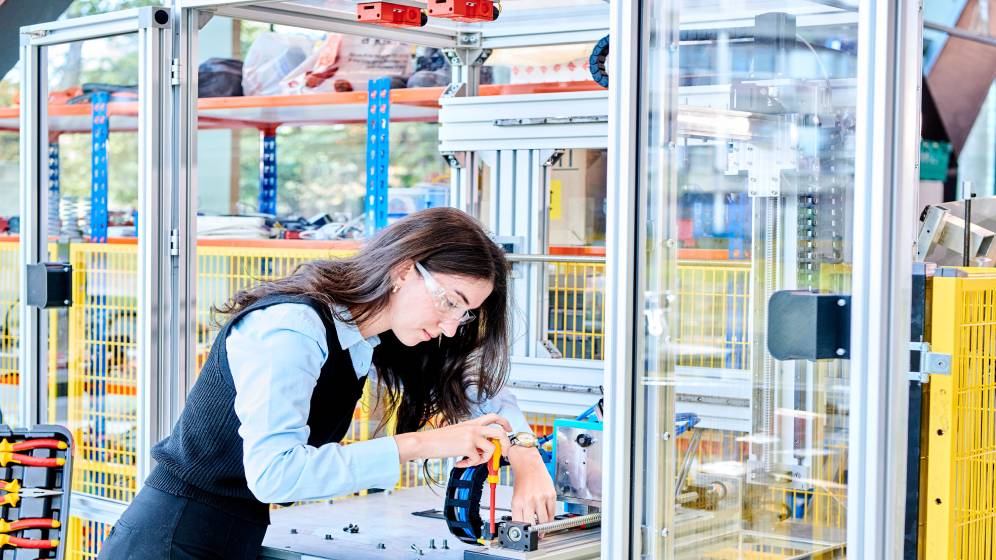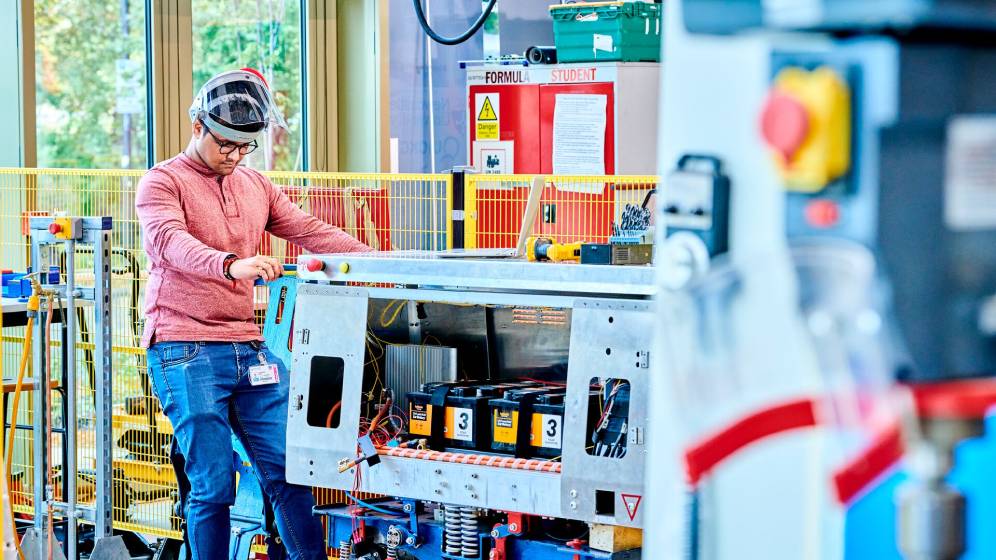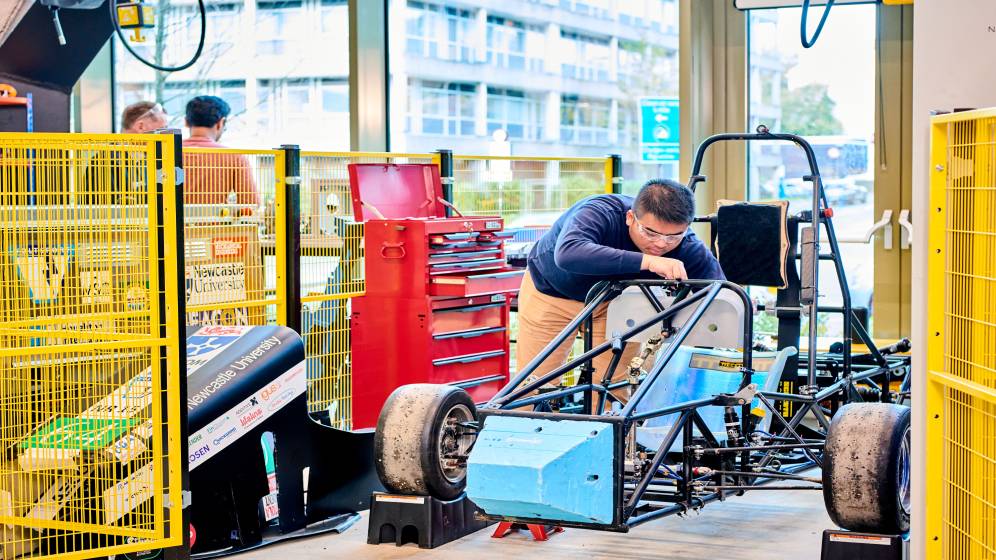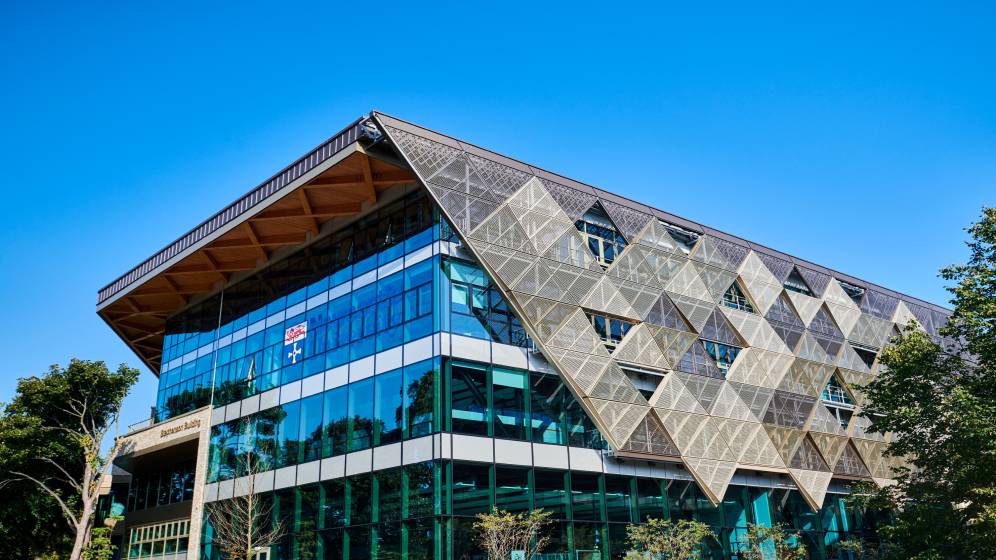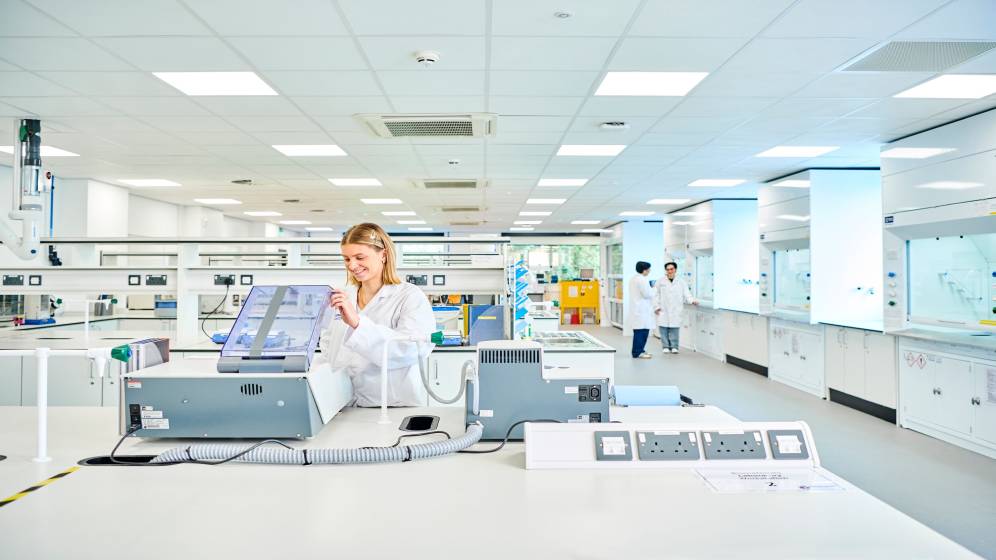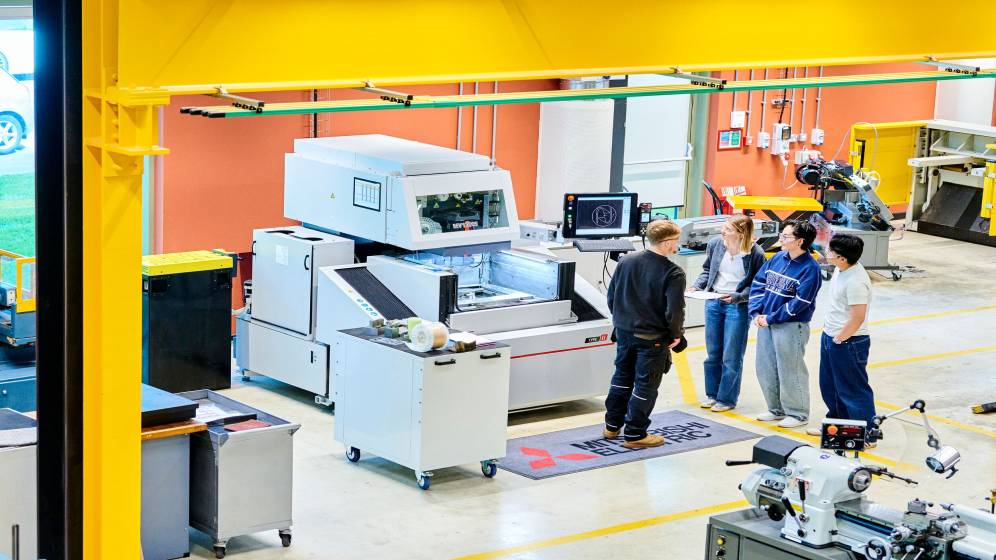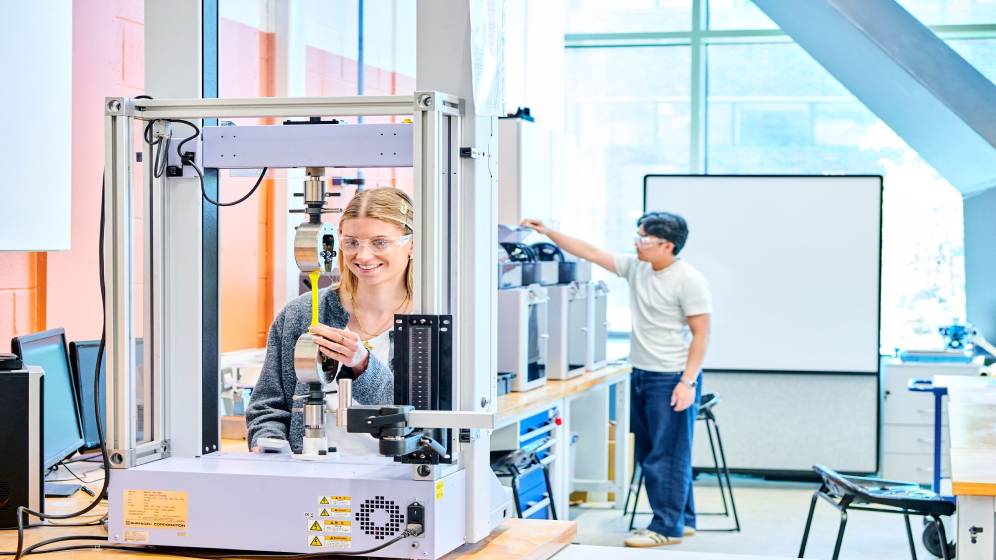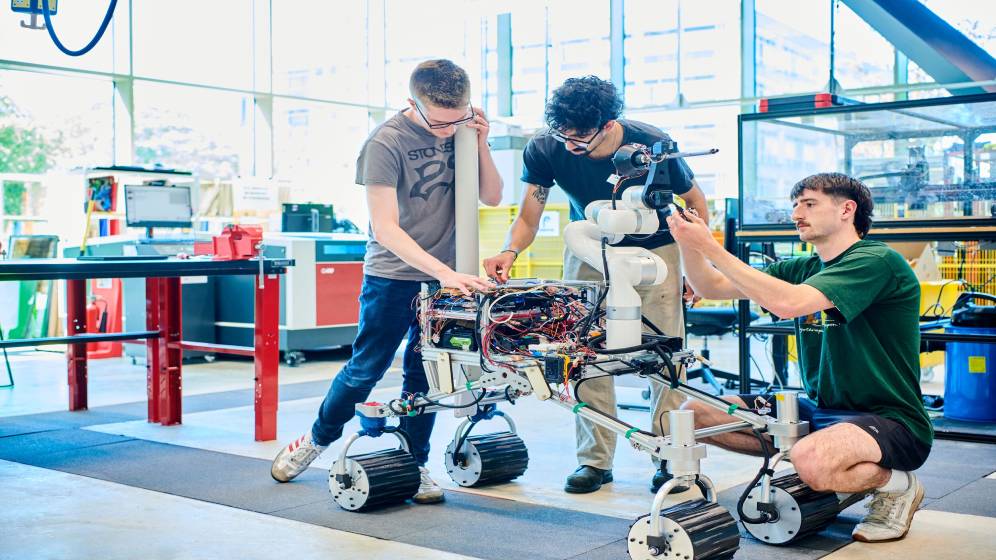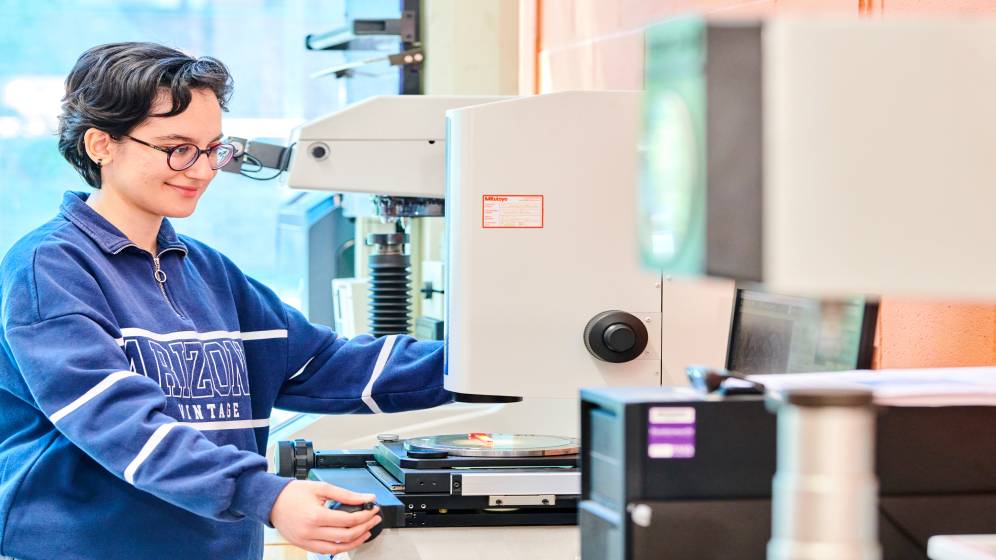Mechanical Engineering MEng Honours
- UCAS code: H301
- Full time
- 4 years
This accredited four-year Mechanical Engineering degree focusses on real-world challenges. The course will prepare you to lead and innovate in the engineering sector.
You are currently viewing course information for entry year: 2026
Next start date:
- September 2026
UCAS Institution name and code:
- NEWC / N21
Course overview
This accredited four-year Mechanical Engineering MEng Honours develops your skills and advanced knowledge across key areas of the subject. With strong industry links, your studies reflect real-world engineering challenges. You'll graduate equipped with the multidisciplinary skills needed to succeed anywhere in engineering. Our degree also provides a direct route to Chartered Engineer status.
In Stage 4 you'll deepen your knowledge in more advanced topics, and specialise in a field that interests you. This enables you to graduate in your chosen specialism tailored to your career of choice. Specialisms include:
- mechanical engineering
- biomedical engineering
- mechatronics
In Stage 4 you will carry out an advanced team project. You'll develop skills towards being a professional chartered engineer.
We work with industry, so your studies reflect the challenges engineers face in the real world. You'll enhance your professional and academic abilities through:
- guest lectures
- placement opportunities
- advanced team projects
- site visits
BEng or MEng?
Both our BEng degree and specialist MEng degrees provide a pathway to becoming a Chartered Engineer. This is one of the most recognisable international engineering qualifications.
Our MEng degrees are a direct route to becoming a Chartered Engineer (CEng). You don’t need to study any more qualifications after your degree to work towards chartered status.
Our three-year BEng degree can also lead to Chartered Engineer status. However, you’ll need to complete further study, such as an approved master’s degree.
READ MORE
Your course and study experience - disclaimers and terms and conditions
Please rest assured we make all reasonable efforts to provide you with the programmes, services and facilities described. However, it may be necessary to make changes due to significant disruption, for example in response to Covid-19.
View our Academic experience page, which gives information about your Newcastle University study experience for the academic year 2025-26.
See our terms and conditions and student complaints information, which gives details of circumstances that may lead to changes to programmes, modules or University services.
Additional information
This degree allows you to explore several engineering disciplines in year one. This flexible route is taught across Civil, Electrical & Electronic and Mechanical Engineering.
You'll gain an understanding of engineering in a multidisciplinary context. You'll develop diverse skills relevant to the needs of industry and today’s global challenges.
After successfully completing Stage 1, you'll have the option of transferring on to one of the accredited Civil, Electrical & Electronic or Mechanical Engineering degrees. This is subject to the degree programme regulations and capacity of the degree you are transferring to.
Specialist areas you may wish to explore as part of the course include:
Mechanical Engineering
Develop the knowledge and skills for a career in Mechanical Engineering. You'll learn how to create products that are functional, innovative and user-friendly. You'll also learn how to manufacture them appropriately and profitably. You'll explore:
- materials degradation
- advanced manufacturing technology
- mechanical power transmission
Biomedical Engineering
Focus on a range of techniques and graduate ready for a career leading in this critical field. You'll explore:
- engineering and medical techniques
- design exploration for artificial joints
- materials investigation to repair soft tissues
- rehabilitation treatment effectiveness
Mechatronics
Focussing on electrical, software and mechanical engineering. You'll explore:
- mechatronic design
- robotics and industrial automation
Quality and ranking
Professional accreditation and recognition
All professional accreditations are reviewed regularly by their professional body.
Modules and learning
Modules
The information below is intended to provide an example of what you will study.
Most degrees are divided into stages. Each stage lasts for one academic year, and you'll complete modules totalling 120 credits by the end of each stage.
Our teaching is informed by research. Course content may change periodically to reflect developments in the discipline, the requirements of external bodies and partners, and student feedback.
Optional module availability
Student demand for optional modules may affect availability.
Full details of the modules on offer will be published through the Programme Regulations and Specifications ahead of each academic year. This usually happens in May.
To find out more please see our terms and conditions
Stage 1 will provide a broad introduction to the principles of engineering. You'll get hands-on experience from the very beginning of your degree, working in a team on a design and build project.
Modules
Stage 2 covers mechanical, thermo-fluid, electrical and materials engineering sciences, engineering design and manufacturing, engineering mathematics, management, professional and enterprise skills.
Modules
In Stage 3, your studies continue to cover a broad range of mechanical engineering topics. You'll develop a broad set of skills and knowledge ready to take into the workplace.
You'll also work on an engineering project selected from a wide range of topics. This project is designed to develop your ability to tackle complex engineering problems while strengthening essential skills such as project planning, time management, critical thinking, and data analysis.
Modules
In Stage 4 you will study advanced specialist topics and complete a major project. You'll also complete a team project designed to develop your project management, design and analysis skills, relevant to your career as an engineer.
In Stage 4 you will study advanced specialist topics and complete a major project. You'll also complete a team project designed to develop your project management, design and analysis skills, relevant to your career as an engineer.
Modules
You take the following compulsory module:
Mechanical Engineering Team Project (40 credits)
You follow one of the specialisms
Mechanical Engineering
| Compulsory modules | Credits |
|---|---|
| 20 | |
| 20 | |
| 20 | |
| 20 |
Biomedical engineering
|
Compulsory modules |
Credits |
|
20 |
|
|
20 |
|
|
20 |
|
|
20 |
Mechatronics
|
Compulsory modules |
Credits |
|
20 |
|
|
20 |
|
|
20 |
|
|
20 |
We base these figures and graphs on the most up-to-date information available to us. They are based on the modules chosen by our students in 2024-25.
Teaching time is made up of:
- scheduled learning and teaching activities. These are timetabled activities with a member of staff present.
- structured guided learning. These are activities developed by staff to support engagement with module learning. Students or groups of students undertake these activities without direct staff participation or supervision
Teaching and assessment
Teaching methods
In Stages 1 and 2 of this degree, your learning experience will typically include lectures, seminars and practical classes. There are also industrial visits, mock interviews, professional skills development, management, and a variety of projects.
In Stages 3 and 4 your timetable will allow more time for your major project work.
Assessment methods
You'll be assessed through a combination of:
-
Assessments
-
Case studies
-
Coursework
-
Dissertation or research project
-
Examinations – practical or online
-
Group work
-
Interviews
-
Portfolio submission
-
Practical sessions
-
Presentations
-
Projects
-
Reflective report/journal
-
Reports
Skills and experience
Practical skills
You'll study in the new Stephenson Building, a world-class engineering facility in the heart of Newcastle. Featuring a state-of-the-art Makerspace, digital learning environments, and specialised labs. This facility offers hands-on experience, preparing you for a successful career in the industry.
You'll also work on an engineering project selected from a wide range of topics and learn from guest lectures, ensuring you're well prepared for the challenges of modern engineering.
Business skills
You'll build critical teamwork and leadership skills through small team projects and individual engineering investigations. These skills are highly valued by employers.
You'll receive training in business and professional skills, and have the opportunity to undertake a professional placement or internship.
Research skills
Your degree is informed by the research of our expert staff based in our research institutes, which specialise in manufacture and materials, fluid dynamics and thermal systems, and bioengineering.
These research groups allow you to draw on the expertise of staff and their connections with industry as well as providing access to specialist facilities.
Opportunities
Work placement
Get career ready with a work placement and leave as a confident professional in your field. You can apply to spend 9 to 12 months working in any organisation in the world, and receive University support from our dedicated team to secure your dream placement. Work placements take place between stages 3 and 4.
You'll gain first-hand experience of working in the sector, putting your learning into practice and developing your professional expertise.
If you choose to take a work placement, it will extend your degree by a year. Placements are subject to availability.
Facilities and environment
Facilities
As a mechanical engineering student you'll be based in the School of Engineering in the heart of our city-centre campus.
You'll have access to a wide range of industry-standard facilities and laboratories such as:
- labs for design-make-test projects: making and testing machines and structures
- strengths (testing) labs with machines up to 500kN and access to machines up to 8MN
- mechatronics/electronics labs for programming robots and automated devices
- bio-engineering lab for bio-materials manufacture and testing of components
- manufacturing lab with good selection of modern CNC machine tools
- composite materials lab with fire test facilities
We also provide high-quality, specialist facilities to support your studies:
- state-of-the-art CAD and CAE 3D design facilities
- HE-Ion and other microscopes with resolutions down to 0.3nm
- wide range of rapid prototyping facilities for projects and research
- engine test cells, wind-tunnel and water flow channels with laser flow management
- Formula Student car design, build and test facilities
- gear and drive system testing machines up to 8MW capacity
- our own 1750hp main-line diesel-electric locomotive
Support
To support you in your studies, all new students entering year 1 or year 2 will receive a start-up pack containing essential personal protective equipment.
You'll have the support of an academic member of staff as a personal tutor throughout your degree to help with academic and personal issues.
Peer mentors will help you in your first year. They are fellow students who can help you settle in and answer any questions you have when starting university.
Your future
Graduates from our Mechanical Engineering course have gone on to work for a range of high-profile companies and organisations, such as:
- EDF Energy
- Jaguar Land Rover
- Doosan Babcock
- Network Rail
- Nissan
- Mott MacDonald
- Survitec Group
Prepare for diverse career paths
Your degree will prepare you for a role in a wide range of sectors, including:
- transport
- logistics
- health
- defence
- manufacturing
- automobile
- renewable energy
The excellent analytical and problem-solving skills you'll gain through studying mechanical engineering will make you an attractive proposition to employers in finance, business consultancy and public services.
Make a difference
Sorry, you need JavaScript to view this video
Careers support
Our Careers Service is one of the largest and best in the country, and we have strong links with employers. We provide an extensive range of opportunities to all students through our ncl+ initiative.
Visit our Careers Service website
Recognition of professional qualifications outside of the UK
If you’re studying an accredited degree and thinking about working in Europe after you graduate, the best place to find current information is the UK Government’s guidance on recognition of UK professional qualifications in EU member states. This official resource explains whether your profession is regulated in another country, what steps you need to take, and which organisation you should contact.
Entry requirements
All candidates are considered on an individual basis and we accept a broad range of qualifications.
The entrance requirements and offers below apply to 2026 entry.
| A-Level | |
|---|---|
| International Baccalaureate | |
|---|---|
Other UK and the Republic of Ireland qualifications
Alternative offers at Newcastle
Through one of our contextual or alternative offer routes, you could receive an offer of up to three grades lower than the typical requirements.
Contextual offers
We use certain contextual data from your UCAS form, alongside your application, to consider challenges that you may have faced in your education and the potential effect this may have had on your qualifications. This means you may be eligible to receive a lower contextual offer.
PARTNERS offers
One of the largest and longest support entry routes to university of its kind for students from underrepresented backgrounds. We support applicants from application through to study.
Realising Opportunities offers
A unique programme delivered in collaboration with 10 leading, research-intensive universities in the UK. The programme is open to students in Year 12/first year of college.
Pathways to Newcastle offers
Pathways to Newcastle, our national skills entry route, is available for specific subject areas.
High Performance Athletes
We support promising athletes at the application stage, who compete in regional, national or international levels in their sport.
Qualifications from outside the UK
English Language requirements
Entrance courses (INTO)
International Pathway courses are specialist programmes designed for international students who want to study in the UK. We provide a range of study options for international students in partnership with INTO.
These courses are specifically designed for international students who want to study in the UK and progress onto one of our undergraduate degrees. Our International Study Centre, has a range of study options including:
- International Foundation
- International Year One
- English Language courses
Find out more about International Pathway courses
Admissions policy
This policy applies to all undergraduate and postgraduate admissions at Newcastle University. It is intended to provide information about our admissions policies and procedures to applicants and potential applicants, to their advisors and family members, and to staff of the University.
University Admissions Policy and related policies and procedures
Credit transfer and Recognition of Prior Learning
Recognition of Prior Learning (RPL) can allow you to convert existing relevant university-level knowledge, skills and experience into credits towards a qualification. Find out more about the RPL policy which may apply to this course.
Additional information
Advice on maths and science requirements
If you don’t think you will have the exact mathematics and science qualifications referred to in our entry requirements by the time you need them, you may not be sure what to do.
- If you have a maths qualification but will not have it at A Level (or equivalent) when you start your degree, you should apply for the relevant degree with Foundation Year. We may give you the opportunity to take the Newcastle University Pre-Entry Maths Course* and the option to start in Year 1 if we think that this will be the best route for you.
- If you have A Level Maths (or equivalent) already but not at the required grade, you should contact us for advice. We may decide that you could be considered for Foundation Year entry, or it may be that this course is not the best option for you.
- If you will not have the equivalent of an A Level in the science subject (if any) required, you should apply for the relevant degree with Foundation Year.
If you are still not sure, don’t worry. Whatever you apply for, our Admissions Tutors will help you decide which is the best route for you. They may, therefore, make you an offer for a different course from the one you apply for (eg Foundation Year entry instead of Year 1 entry).
*The Newcastle University Pre-Entry Maths Course aims to provide the requisite mathematical skills and concepts needed on our engineering, maths and physics degree courses and to prepare students for the modes of learning they will encounter. The materials for the course are delivered electronically and include opportunities to practise your skills. You study the materials in your own time and, when you are ready, you book your exam with the Engineering School to which you have applied. A fee of £150 is payable at the time of booking the exam or shortly before the date set for examination.
Tuition fees and scholarships
Tuition fees for academic year 2026-2027
The 2026 entry home fees have not yet been confirmed.
| Qualification: MEng Honours | |
|---|---|
|
Home students full time 4 years |
Tuition fees (Year 1)
Not set |
|
International students full time 4 years |
Tuition fees (Year 1)
30,700 |
Year abroad and additional costs
For programmes where you can spend a year on a work placement or studying abroad, you will receive a significant fee reduction for that year.
Some of our degrees involve additional costs which are not covered by your tuition fees.
Scholarships
Find out more about:
Open days and events
You'll have a number of opportunities to meet us throughout the year at our on-campus and virtual open days.
You'll be able to:
- explore our beautiful campus
- find out about our vibrant city
- discover what students think about studying at Newcastle
You'll also have the opportunity to speak to academic staff and find out more about the subjects you're interested in.
Find out about how you can visit Newcastle in person and virtually.
We regularly travel overseas to meet with students interested in studying at Newcastle University. Visit our events calendar to find out when we're visiting your region.
How to apply
Apply through UCAS
To apply for undergraduate study at Newcastle University, you must use the online application system managed by the Universities and Colleges Admissions Service (UCAS). All UK schools and colleges, and a small number of EU and international establishments, are registered with UCAS. You will need:
- the UCAS name and institution codes for Newcastle University (NEWC/N21)
- the UCAS code for the course you want to apply for
- the UCAS 'buzzword' for your school or college
If you are applying independently, or are applying from a school or college which is not registered to manage applications, you will still use the Apply system. You will not need a buzzword.
Apply through UCASApply through an agent
International students often apply to us through an agent. Have a look at our recommended agents and get in touch with them.
Get in touch
By phone
Call us on +44 (0) 191 208 3333 and press option 1. Our opening hours are Monday to Friday 10am until 4pm.
Live chat
Our NCL chatbot might be able to give you an answer straight away. If not, it’ll direct you to someone who can help.
You'll find our NCL chatbot in the bottom right of this page.
Online
Chat to our students
Choosing a university is a big decision. If you've got questions about a particular course, student life or the city of Newcastle, why not chat to our friendly students or graduates!
Keep updated
We regularly send email updates and extra information about the University.
Receive regular updates by email










